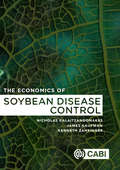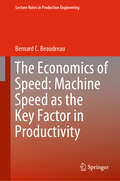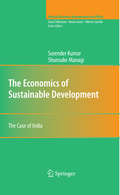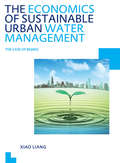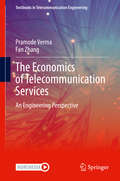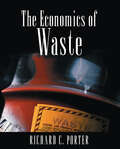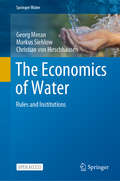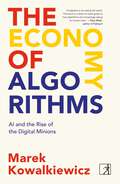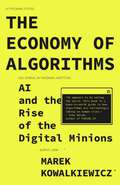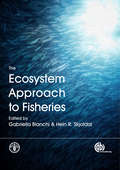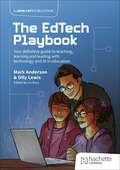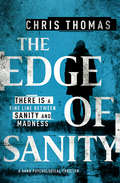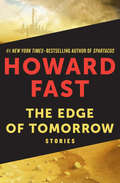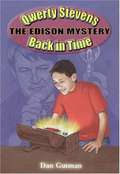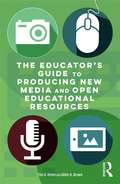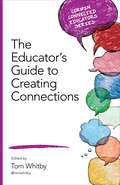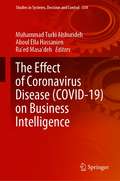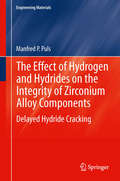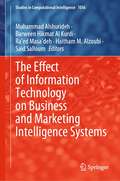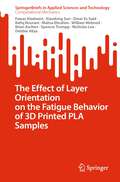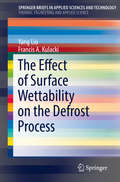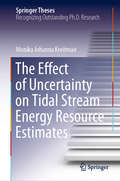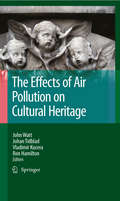- Table View
- List View
The Economics of Soybean Disease Control
by Nicholas Kalaitzandonakes James Kaufman Kenneth ZahringerWorldwide soybean crop yields can achieve USD$130 billion per year in farm-level sales, but around 13% of these yields are lost to disease. Effective disease management could generate significant economic benefits, and while disease management strategies do exist, their application remains limited among producers, often due to an incomplete understanding of disease incidence and severity, as well as perceived complexities of these strategies and a lack of information regarding success rates. This book presents an economic perspective on disease control, with an emphasis on producer choice among alternative technologies and potential changes in cropping systems. It provides an overview of global soybean diseases, their economic significance and management, and covers farm-level decision making, economic payoffs of alternative disease practices and key uncertainties. The book also outlines a global economic model that evaluates disease distribution and management implications. Key features include: - Extensive empirical case studies of soybean disease control, offering strategies for economically optimal management of diseases such as soybean seedling disease and root rot. - Analysis of economic factors to guide farm-level decision making. - Consideration of new technologies in disease management and their potential market-level impacts. This text is recommended for students and researchers in plant pathology and agricultural economics, as well as professionals in the soybean production industry.
The Economics of Speed: Machine Speed as the Key Factor in Productivity (Lecture Notes in Production Engineering)
by Bernard C. BeaudreauThis is the first book to examine the “nuts and bolts” of production processes. It proposes a truly consilient approach to modeling production processes – one that goes beyond the vague principles found in standard economics – and provides details that are consistent with the applied mechanics and engineering literature. Providing a credible analysis of some of the most pressing questions of our era, such as the productivity slowdown and the information paradox, and bridging the gap between engineering, applied physics, economics, and management science, this book is a fascinating read for anyone interested in industry, the modern economy, and how physical factors constrain productivity growth.
The Economics of Sustainable Development
by Shunsuke Managi Surender KumarThis book provides a look at the current status and future potential of sustainable development in India. Macroeconomic developments, regional disparity and poverty situation, the trend in natural resource depletion and environmental degradation, trajectory of economic development, and conventional wealth are discussed. A history of environmental regulations and the current state of the environment in India are provided along with the possible reasons for non-compliance of environmental standards in the country. This book studies many different aspects of industries in India from supply and demand sides and efficiency and productivity analyses are provided in detail. Before the liberalization of its economy began in 1991, India had been one of the most over-regulated and closed economies in the world. Market productivity is examined and tests whether the post-reform period shows any improvement in productivity and efficiency in comparison to the pre-reform period. Other subjects are discussed, including the economic value that the urban population of India places on improving the air quality, the cost of sustainable industrial development, industrial water use and analysis of the relationship between the price of oil and the macro economy as it applies to India.
The Economics of Sustainable Urban Water Management: UNESCO-IHE PhD Thesis
by Xiao LiangRapid population growth, limited water availability, climate variability and environmental pollution together cause a significant challenge to provide sufficient water to urban residents in a sustainable and effective way. Advanced water treatment technology can contribute to the solution of problems physically, but it may not ensure sustainable op
The Economics of Telecommunication Services: An Engineering Perspective (Textbooks in Telecommunication Engineering)
by Fan Zhang Pramode VermaThis textbook characterizes the economics of telecommunication services from an engineering perspective. The authors bring out the fundamental drivers of the industry and characterize networks from a graph theoretic perspective, including random, small world, and scale free networks. The authors relate the topology of a telecommunication network using circuit and packet switched architectures to throughput and other performance parameters. The pricing model proposed in this book is based on the cost of displaced opportunity as opposed to the cost of the elements of the network engaged in delivering a service. The displaced opportunity is characterized by the revenue associated with the service that the network could have alternatively delivered most efficiently using an identical level of resources. The book addresses other topics such as regulation in legacy networks, and net neutrality. Finally, the book introduces the application of game theory in a multi-vendor, multi-services competitive marketplace. The book aims to bridge the gap between the science of economics as practiced by economists and practice of pricing from a telecommunication engineer’s perspective. This book is suitable for use by senior undergraduate or graduate students of telecommunication engineering or researchers and practitioners in telecommunication engineering.
The Economics of Waste (Rff Press Ser.)
by Richard C. PorterIn this concise, engaging, and provocative work, Richard Porter introduces readers to the economic tools that can be applied to problems involved in handling a diverse range of waste products from business and households. Emphasizing the impossibility of achieving a zero-risk environment, Porter focuses on the choices that apply in real world decisions about waste. Acknowledging that effective waste policy integrates knowledge from several disciplines, Porter focuses on the use of economic analysis to reveal the costs of different policies and therefore how much can be done to meet goals to protect human health and the environment. With abundant examples, he considers subjects such as landfills, incineration, and illegal disposal. He discusses the international trade in waste, the costs and benefits of recycling, and special topics such as hazardous materials, Superfund, and nuclear waste. While making clear his belief that not every form of waste presents the same amount of risk, Porter stresses the need for open-minded approaches to developing new policies. For students, policymakers, and general readers, he provides insight and accessibility to a subject that others might leave out-of-sight, out-of-mind, or buried under an impenetrable prose of statistics and jargon.
The Economics of Water: Rules and Institutions (Springer Water)
by Georg Meran Markus Siehlow Christian von HirschhausenThis open access textbook provides a concise introduction to economic approaches and mathematical methods for the study of water allocation and distribution problems. Written in an accessible and straightforward style, it discusses and analyzes central issues in integrated water resource management, water tariffs, water markets, and transboundary water management. By illustrating the interplay between the hydrological cycle and the rules and institutions that govern today’s water allocation policies, the authors develop a modern perspective on water management. Moreover, the book presents an in-depth assessment of the political and ethical dimensions of water management and its institutional embeddedness, by discussing distribution issues and issues of the enforceability of human rights in managing water resources. Given its scope, the book will appeal to advanced undergraduate and graduate students of economics and engineering, as well as practitioners in the water sector, seeking a deeper understanding of economic approaches to the study of water management.
The Economy of Algorithms: AI and the Rise of the Digital Minions
by Marek Kowalkiewicz&‘A damn well-written book . . . a thrilling, entertaining whirlwind tour of different AI algorithms and their industry applications.&’ —Tobias Lange, Senior Vice President, Siemens Digital Industries Software Welcome to the economy of algorithms. It&’s here and it&’s growing. In the past few years, we have been flooded with examples of impressive technology. Algorithms have been around for hundreds of years, but they have only recently begun to &‘escape&’ our understanding. We are so impressed by what they can do that we give them a lot of agency. But because they are so hard to comprehend, this leads to all kinds of unintended consequences. In the twentieth century, we had the economy of corporations. In the first two decades of the twenty-first century, we saw the emergence of the economy of people, otherwise known as the digital economy, enabled by the internet. Now we&’re seeing a new economy take shape: the economy of algorithms. – How can we use algorithms to automate the boring parts of our jobs, enhance decision-making and drive innovation? – Where is the line between algorithmic &‘help&’ and surveillance? – Can an algorithm take your job? – How do you advertise to a fridge? – Do algorithms dream of electric sheep? – Why is it so hard to predict where technology will go next? These questions and more are answered by this exciting and ground-breaking book, which includes nine rules for flourishing in the new economy of algorithms.
The Economy of Algorithms: AI and the Rise of the Digital Minions
by Marek KowalkiewiczAn informed general readership, including students and interested non-specialists. Academics from business, sociology, politics, management, science and technology studies and emerging fields such as critical algorithm studies will find it a stimulating and entertaining read. Reflective practitioners who are beginning to question the potential social impacts of their work (see current explosion of tech worker activism).
The Ecosystem Approach to Fisheries
by Hein Rune Skjoldal Gabriella BianchiThe ecosystem approach to fisheries management is high on national, regional and international agendas for sustainable fisheries management. Implementing the Ecosystem Approach to Fisheries covers both theoretical and applied aspects, with a particular emphasis on practical experiences in the form of case studies from around the world, and tools for solutions. Researchers, practitioners and policy makers in fisheries, aquaculture, marine biology and ecology will find this book an invaluable overview and guide to fisheries management.
The EdTech Playbook: Your Definitive Guide to Teaching, Learning and Leading with Technology and AI in Education
by Mark Anderson Olly LewisThe EdTech Playbook is your go-to guide to using EdTech in evidence-informed ways to help you work smarter, transform your teaching and enrich students' learning.Whether you're an experienced educator or newly qualified, this book is packed with practical strategies and real-life examples from fellow teachers you can benefit from. Learn about:- expert advice from experienced authors who know what works- powerful case studies showcasing how educators at all levels use technology to make a difference- time-saving tips to reclaim your precious time- how to leverage AI to support your teaching and their learning- workable ideas to bring light into your everyday teaching practice- how to support digital transformation at scale- the importance of online safety and the role of safeguarding and data privacy in EdTech.The EdTech Playbook is your roadmap to increasing not just your knowledge and skills, but also your creativity in how you apply technology in the classroom. Dive in and become the tech-savvy educator you've always dreamed of being!
The EdTech Playbook: Your Definitive Guide to Teaching, Learning and Leading with Technology and AI in Education
by Mark Anderson Olly LewisThe EdTech Playbook is your go-to guide to using EdTech in evidence-informed ways to help you work smarter, transform your teaching and enrich students' learning.Whether you're an experienced educator or newly qualified, this book is packed with practical strategies and real-life examples from fellow teachers you can benefit from. Learn about:- expert advice from experienced authors who know what works- powerful case studies showcasing how educators at all levels use technology to make a difference- time-saving tips to reclaim your precious time- how to leverage AI to support your teaching and their learning- workable ideas to bring light into your everyday teaching practice- how to support digital transformation at scale- the importance of online safety and the role of safeguarding and data privacy in EdTech.The EdTech Playbook is your roadmap to increasing not just your knowledge and skills, but also your creativity in how you apply technology in the classroom. Dive in and become the tech-savvy educator you've always dreamed of being!
The Edge of Sanity: A Dark Psychological Thriller
by Chris ThomasA new drug will give you your best—and last—high in this “amazing follow up to Enter the Dark . . . Fast-paced, gruesome and very dark” (The Book Magnet).In a derelict squat, the Smart Man watches as the new narcotic developed by his shadowy organisation wreaks havoc on its unsuspecting victims. The drug is now ready for sale on their exclusive darknet marketplace.Meanwhile, former detective Pete Harris had started a new life away from the Cyber Crimes Unit with his daughter and begins to rekindle his relationship with a former colleague. Unknown to Pete, the retired head of the unit has sought out crime boss Curtis Slater and offered him information—for a price.With his life seemingly complete, Pete’s world comes crashing down as he is drawn into Slater’s game with fatal consequences. He must join forces with his old enemies in a race against time. But can Pete save his loved ones from the clutches of Slater, the Smart Man . . . and a sinister ringmaster?“An action-packed story! Interesting plot threads cleverly woven together, with plenty to keep the reader turning the pages.” —Bibliophile Book Club
The Edge of Tomorrow: A Novel
by Howard FastScience fiction stories from the #1 New York Times–bestselling author of Spartacus. From one of the most prolific and versatile writers of the twentieth century, The Edge of Tomorrow is a collection of tales that journey outside everyday boundaries to offer insight into our own universe. Featuring big bugs, cloned cats, and feral star-children, these unconventional, thought-provoking stories reveal much about the America of their time, when the Cold War and the nascent civil rights movement stoked unconscious fears and desires. From &“The First Men,&” about scientists tampering with genetic engineering, to &“The Large Ant,&” about a man&’s thoughtless violence against nature, these stories by the author of April Morning and The Immigrants—described by the Los Angeles Times as &“one of our very best&”—are as relevant today as when they were first written. This ebook features an illustrated biography of Howard Fast including rare photos from the author&’s estate.
The Edison Mystery
by Dan GutmanThirteen-year-old Robert "Qwerty" Stevens uses the time machine he finds in his backyard to visit Thomas Edison's workshop in 1879, and there helps develop the electric light bulb, but then needs his sister's help to return to his own time.
The Educator's Guide to Producing New Media and Open Educational Resources
by Abbie H. Brown Tim D. GreenDigital video, audio, and text have never been more popular, and educators need to know how to make new media work in all types of learning environments. The Educator’s Guide to Producing New Media and Open Educational Resources provides practical advice on how to produce and use open access resources to support student learning. This realistic "how-to" guide is written for education professionals in any discipline seeking to transform their instruction with technology.
The Educator′s Guide to Creating Connections (Corwin Connected Educators Series)
by Tom WhitbyBlogging, social media, and PLN’s made easy! Collectively, we’re all smarter than we are individually. In this expert guide, EdTech leaders help you harness the power of connected collaboration using the Internet and social media. You’ll easily leverage Twitter, Facebook, LinkedIn and beyond for profound professional growth. Use real-world tips and tools to: Master and adapt to 21st Century teaching methodologies Build ongoing technology literacy for you and your students Connect and collaborate with education leaders across the globe Get connected. Get engaged. Use this inspiring, step-by-step manual to expand your personal and professional network today! The Corwin Connected Educators series is your key to unlocking the greatest resource available to all educators: other educators. Being a Connected Educator is more than a set of actions: it’s a belief in the potential of technology to fuel lifelong learning. "The successful educator is a connected educator. Quite simply, this book is a manual to stay relevant and energized in a rapidly changing profession. I highly recommend this as the definitive guidebook on building connections for the modern educator." Vicki Davis, Author "Reinventing Writing" Tom Whitby has brought together a who′s who list any educator would want to be connected with and learn from! His latest book shares great ideas on how teachers can use online strategies as one way to look and learn beyond our all-too-often isolated classrooms. Larry Ferlazzo, Award-Winning Teacher, Blogger, and Author Helping Students Motivate Themselves
The Educator′s Guide to Creating Connections (Corwin Connected Educators Series)
by Tom WhitbyBlogging, social media, and PLN’s made easy! Collectively, we’re all smarter than we are individually. In this expert guide, EdTech leaders help you harness the power of connected collaboration using the Internet and social media. You’ll easily leverage Twitter, Facebook, LinkedIn and beyond for profound professional growth. Use real-world tips and tools to: Master and adapt to 21st Century teaching methodologies Build ongoing technology literacy for you and your students Connect and collaborate with education leaders across the globe Get connected. Get engaged. Use this inspiring, step-by-step manual to expand your personal and professional network today! The Corwin Connected Educators series is your key to unlocking the greatest resource available to all educators: other educators. Being a Connected Educator is more than a set of actions: it’s a belief in the potential of technology to fuel lifelong learning. "The successful educator is a connected educator. Quite simply, this book is a manual to stay relevant and energized in a rapidly changing profession. I highly recommend this as the definitive guidebook on building connections for the modern educator." Vicki Davis, Author "Reinventing Writing" Tom Whitby has brought together a who′s who list any educator would want to be connected with and learn from! His latest book shares great ideas on how teachers can use online strategies as one way to look and learn beyond our all-too-often isolated classrooms. Larry Ferlazzo, Award-Winning Teacher, Blogger, and Author Helping Students Motivate Themselves
The Effect of Coronavirus Disease (Studies in Systems, Decision and Control #334)
by Aboul Ella Hassanien Muhammad Turki Alshurideh Ra’ed Masa’dehThis book includes recent research works on how business around the world affected by the time of COVID-19 pandemic. The impact of recent technological developments has had a tremendous impact on how we manage disasters. These developments have changed how countries and governments collect information. The COVID-19 pandemic has forced online service companies to maintain and build relationships with consumers when their world turns. Businesses are now facing tension between generating sales during a period of severe economic hardship and respect for threats to life and livelihoods that have changed consumer preferences.
The Effect of Hydrogen and Hydrides on the Integrity of Zirconium Alloy Components
by Manfred P. PulsBy drawing together the current theoretical and experimental understanding of the phenomena of delayed hydride cracking (DHC) in zirconium alloys, The Effect of Hydrogen and Hydrides on the Integrity of Zirconium Alloy Components: Delayed Hydride Cracking provides a detailed explanation focusing on the properties of hydrogen and hydrides in these alloys. Whilst the emphasis lies on zirconium alloys, the combination of both the empirical and mechanistic approaches creates a solid understanding that can also be applied to other hydride forming metals. This up-to-date reference focuses on documented research surrounding DHC, including current methodologies for design and assessment of the results of periodic in-service inspections of pressure tubes in nuclear reactors. Emphasis is placed on showing how our understanding of DHC is supported by progress in general understanding of such broad fields as the study of hysteresis associated with first order phase transformations, phase relationships in coherent crystalline metallic solids, the physics of point and line defects, diffusion of substitutional and interstitial atoms in crystalline solids, and continuum fracture and solid mechanics. Furthermore, an account of current methodologies is given illustrating how such understanding of hydrogen, hydrides and DHC in zirconium alloys underpins these methodologies for assessments of real life cases in the Canadian nuclear industry. The all-encompassing approach makes The Effect of Hydrogen and Hydrides on the Integrity of Zirconium Alloy Component: Delayed Hydride Cracking an ideal reference source for students, researchers and industry professionals alike.
The Effect of Information Technology on Business and Marketing Intelligence Systems (Studies in Computational Intelligence #1056)
by Ra’ed Masa’deh Muhammad Alshurideh Barween Hikmat Al Kurdi Haitham M. Alzoubi Said SalloumBusiness shapes have been changed these days. Change is the main dominant fact that change the way of business operations running. Topics such as innovation, entrepreneurship, leadership, blockchain, mobile business, social media, e-learning, machine learning, and artificial intelligence become essential to be considered by each institution within the technology era. This book tries to give additional views on how technologies influence business and marketing operations for insuring successful institutions survival.The world needs to develop management and intelligent business scenario plans that suite a variety of crisis appears these days. Also, business and marketing intelligence should meet government priorities in individual countries and minimise the risk of business disruptions. Business intelligence - the strategies and technology companies that use it to collect, interpret, and benefit from data - play a key role in informing company strategies, functions, and efficiency. However, being essential to the success, many companies are not taking advantage of tools that can improve their business intelligence efforts. Information technology become a core stone in business. For example, the combination of machine learning and business intelligence can have a far-reaching impact on the insights the company gets from its available data to improve productivity, quality, customer service and more. This book is important because it introduces a large number of chapters that discussed the implications of different Information technology applications in business. This book contains a set of volumes which are: 1- Social Marketing and Social Media Applications, 2- Social Marketing and Social Media Applications, 3- Business and Data Analytics, 4- Corporate governance and performance, 5- Innovation, Entrepreneurship and leadership, 6- Knowledge management, 7- Machine learning, IOT, BIG DATA, Block Chain and AI, 8- Marketing Mix, Services and Branding.
The Effect of Layer Orientation on the Fatigue Behavior of 3D Printed PLA Samples (SpringerBriefs in Applied Sciences and Technology)
by Rafiq Noorani Fawaz Aladwani Xiaodong Sun Omar Es-Said Mahsa Ebrahim William Melmed Brian Avchen Spencer Trumpp Nicholas Lee Debbie AliyaThis book presents fused deposition modeling (FDM) which is an additive manufacturing (AM) process to fabricate 3D parts from a build-up of 2D layers. The chapters present an experimental analysis of fatigue characteristics of FDM-processed PLA samples. The results indicate that the concentric build orientation provides highest cycles of fatigue, ultimate strength, and impact energy. The effect of layer orientation on the fatigue behavior of 3D-printed PLA samples is investigated in this case study.
The Effect of Surface Wettability on the Defrost Process (SpringerBriefs in Applied Sciences and Technology)
by Francis A. Kulacki Yang LiuThis SpringerBrief presents a recent advancement in modeling and measurement of the effect of surface wettability on the defrost process. Carefully controlled laboratory measurements of the defrosting of cooled surfaces are used to reveal the effect of surface wetting properties on the extent and speed of frost removal by melting or slumping. The experiments are accompanied by visualization of frost removal at several defrosting conditions. Analysis breaks the defrost process into three stages according to the behavior of the meltwater. Surface wetting factors are included, and become significant when sufficient meltwater accumulates between the saturated frost layer and the surface. The book is aimed at researchers, practicing engineers and graduate students.
The Effect of Uncertainty on Tidal Stream Energy Resource Estimates (Springer Theses)
by Monika Johanna KreitmairThis thesis is focused on river and tidal stream power assessment, focussing particularly on uncertainties in power estimates resulting from inaccurate characterisation of bed roughness and turbine drag. It presents analytical and numerical models for the transfer of these uncertainties through to turbine power uncertainty in a strait, exploring how this affects metrics such as mean power and its standard deviation. Perturbation methods are used to determine the leading-order effects of friction and drag uncertainty in tidal stream power assessment.The methods for uncertainty transfer presented in this thesis could readily be applied to numerous other problems encountered in hydraulic engineering, such as flow routing, urban flood risk, and reservoir sedimentation. It will therefore be of interest to researchers, engineers, and students in these fields.
The Effects of Air Pollution on Cultural Heritage
by Ron Hamilton John Watt Johan Tidblad Vladimir KuceraThis book reviews the sources of the air pollutants responsible for building damage and the mechanisms involved. Studies investigating the relationships between pollution concentration (dose) and the resulting damage (response) are described and the latest research findings for dose-response functions are presented. Trends in pollutant emissions, ambient concentrations and building damage over time are described and future predictions are presented. Methodologies for assessing the extent of the potential problem in a region - the stock at risk - are presented. Procedures for estimating the economic implications are described and the consequences are discussed in detail, because economic factors are important for reaching policy and management decisions at local, national and international scales. Damage to cultural heritage buildings is an important additional effect which needs to be considered as the standards are revised and the factors which will need to be brought into the assessment are presented.
